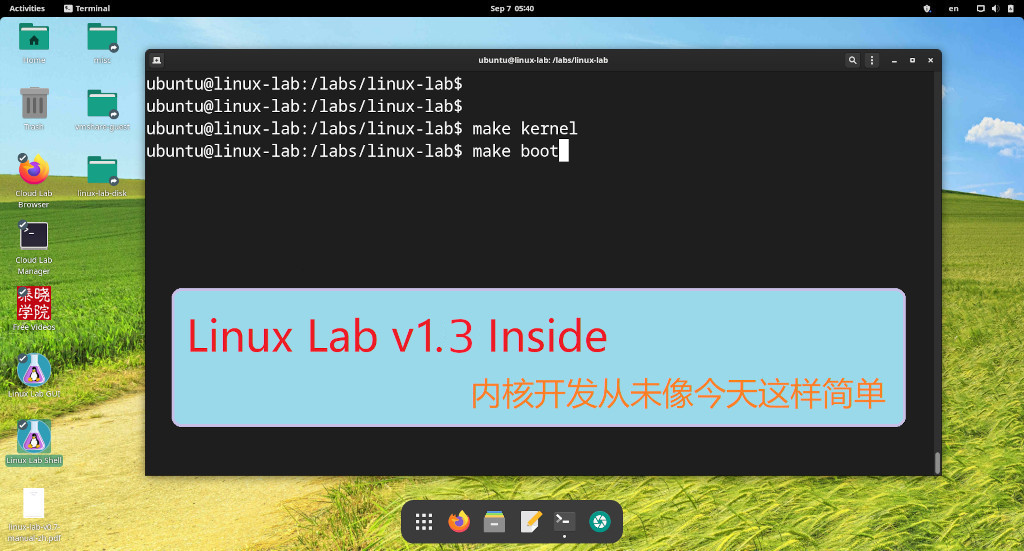[置顶] 泰晓 RISC-V 实验箱,配套 30+ 讲嵌入式 Linux 系统开发公开课
eBPF 程序装载、翻译与运行过程详解
By Wu Daemon of TinyLab.org 2020/2/20
前言
上一篇 我们讲述了 eBPF 框架,了解了 BPF 程序的组成,大致分析了 bpf 指令和 map 数据通信,本节来分析下调用流程。
BPF 程序格式为 ELF
加载 bpf 程序实质上是加载 ELF 格式文件,Linux 加载普通 ELF 格式的文件在通过 load_elf_binary 来实现,而 Linux 加载 bpf elf 其实在用户态实现的,使用的是开源的 libelf 库实现的,调用过程不太一样,而且只是把 ELF 格式的指令 dump 出来,接下来还需要 JIT 编译器翻译出机器汇编码才能执行,这个调用过程比 Linux 加载普通 ELF 格式文件简单。
libelf 库实现的各个 API 可参考如下 链接 以及我们专门为此准备的 libelf 开源库用法详解。
ELF 格式的详解可参考社区创始人撰写的开源书籍 C 语言编程透视 和配套视频课程《360° 剖析 Linux ELF》。
ELF 文件大体结构
ELF 文件大体结构如下所示,包含 ELF 头部,程序头表,各个段和程序段表:
ELF Header #程序头,有该文件的Magic number(参考man magic),类型等
Program Header Table #对可执行文件和共享库有效,它描述下面各个节(section)组成的段
Section1
Section2
Section3
.....
Program Section Table #仅对可重定位目标文件和静态库有效,用于描述各个Section的重定位信息等。
BPF 程序 Section 解析:get_sec
samples/bpf/bpf_load.c 中通过 get_sec 函数调用 libelf 库的 API 获取 section 内容,其中第四个参数是传入段的名字,最后一个参数获得的是该段的数据:
static int get_sec(Elf *elf, int i, GElf_Ehdr *ehdr, char **shname,
GElf_Shdr *shdr, Elf_Data **data)
{
Elf_Scn *scn;
scn = elf_getscn(elf, i); //从elf描述符获取按照节索引获取节接口
if (!scn)
return 1;
if (gelf_getshdr(scn, shdr) != shdr) // 通过节结构复制节表头
return 2;
*shname = elf_strptr(elf, ehdr->e_shstrndx, shdr->sh_name); // 从指定的字符串表中通过偏移获取字符串
if (!*shname || !shdr->sh_size)
return 3;
*data = elf_getdata(scn, 0); //从节中获取节数据(经过了字节序的转换)
if (!*data || elf_getdata(scn, *data) != NULL)
return 4;
return 0;
}
BPF 程序装载与解析:load_bpf_file
tracex4_user.c 通过 load_bpf_file 加载 .o 文件,我们来分析一下。
load_bpf_file 实质是调用 do_load_bpf_file,在这个函数里首先打开 .o 文件,do_load_bpf_file 会将输入的 .o 文件作为 ELF 格式文件,逐个 section 进行分析:
- 如 section 的名字是特殊的(比如 ‘kprobe’),那么就会将这个 section 的内容作为
load_and_attach的参数。 - 如 section 的名字是 “license” 或 “version” 则保存 license 或 version。
- 如 section 是 map 则解析出 map 段
samples/bpf/bpfload.c 中的相关代码如下:
static int do_load_bpf_file(const char *path, fixup_map_cb fixup_map)
{
int fd, i, ret, maps_shndx = -1, strtabidx = -1;
Elf *elf;
GElf_Ehdr ehdr;
GElf_Shdr shdr, shdr_prog;
Elf_Data *data, *data_prog, *data_maps = NULL, *symbols = NULL;
char *shname, *shname_prog;
int nr_maps = 0;
... ...
fd = open(path, O_RDONLY, 0); //打开elf文件
if (fd < 0)
return 1;
elf = elf_begin(fd, ELF_C_READ, NULL);//获取elf描述符,使用‘读取’的方式
... ...
if (gelf_getehdr(elf, &ehdr) != &ehdr) //获取elf文件头副本
return 1;
... ...
/* scan over all elf sections to get license and map info */
for (i = 1; i < ehdr.e_shnum; i++) { //遍历各个section
if (get_sec(elf, i, &ehdr, &shname, &shdr, &data)) // shname 为"section"的名字
continue;
if (0) /* helpful for llvm debugging */ //打印各个section 对应的数据保存在data->d_buf中
printf("section %d:%s data %p size %zd link %d flags %d\n",
i, shname, data->d_buf, data->d_size,
shdr.sh_link, (int) shdr.sh_flags);
if (strcmp(shname, "license") == 0) { //如果是"license"段
processed_sec[i] = true;
memcpy(license, data->d_buf, data->d_size); //把 data->d_buf 拷贝到license数组
} else if (strcmp(shname, "version") == 0) { //如果是"version"段
processed_sec[i] = true;
if (data->d_size != sizeof(int)) {
printf("invalid size of version section %zd\n",
data->d_size);
return 1;
}
memcpy(&kern_version, data->d_buf, sizeof(int));//把 data->d_buf 拷贝到kern_version变量
} else if (strcmp(shname, "maps") == 0) { //如果是map 段
int j;
maps_shndx = i;
data_maps = data;
for (j = 0; j < MAX_MAPS; j++)
map_data[j].fd = -1;
} else if (shdr.sh_type == SHT_SYMTAB) {
strtabidx = shdr.sh_link;
symbols = data;
}
... ...
if (data_maps) { //对map段的处理
nr_maps = load_elf_maps_section(map_data, maps_shndx,elf, symbols, strtabidx); //获取map段内容
if (nr_maps < 0) {
printf("Error: Failed loading ELF maps (errno:%d):%s\n",
nr_maps, strerror(-nr_maps));
goto done;
}
if (load_maps(map_data, nr_maps, fixup_map)) //这里加载map
goto done;
map_data_count = nr_maps;
processed_sec[maps_shndx] = true;
}
/* process all relo sections, and rewrite bpf insns for maps */
for (i = 1; i < ehdr.e_shnum; i++) { //遍历所有的重定向段,
if (processed_sec[i]) ////flag 置位表示已经是处理了的段 ,跳过去
continue;
if (get_sec(elf, i, &ehdr, &shname, &shdr, &data))
continue;
if (shdr.sh_type == SHT_REL) {
struct bpf_insn *insns;
/* locate prog sec that need map fixup (relocations) */
if (get_sec(elf, shdr.sh_info, &ehdr, &shname_prog,
&shdr_prog, &data_prog)) //该段保存到data_prog
continue;
if (shdr_prog.sh_type != SHT_PROGBITS ||
!(shdr_prog.sh_flags & SHF_EXECINSTR))
continue;
insns = (struct bpf_insn *) data_prog->d_buf; //得到bpf字节码对应的结构体
processed_sec[i] = true; /* relo section */
if (parse_relo_and_apply(data, symbols, &shdr, insns,
map_data, nr_maps))
continue;
}
}
/* load programs */
for (i = 1; i < ehdr.e_shnum; i++) {
if (processed_sec[i]) //flag 置位表示已经是处理了的段 ,跳过去
continue;
if (get_sec(elf, i, &ehdr, &shname, &shdr, &data))
continue;
if (memcmp(shname, "kprobe/", 7) == 0 ||
memcmp(shname, "kretprobe/", 10) == 0 ||
memcmp(shname, "tracepoint/", 11) == 0 ||
memcmp(shname, "raw_tracepoint/", 15) == 0 ||
memcmp(shname, "xdp", 3) == 0 ||
memcmp(shname, "perf_event", 10) == 0 ||
memcmp(shname, "socket", 6) == 0 ||
memcmp(shname, "cgroup/", 7) == 0 ||
memcmp(shname, "sockops", 7) == 0 ||
memcmp(shname, "sk_skb", 6) == 0 ||
memcmp(shname, "sk_msg", 6) == 0) {
ret = load_and_attach(shname, data->d_buf,
data->d_size); //事件类型 字节码 字节码大小
if (ret != 0)
goto done;
}
}
done:
close(fd);
return ret;
}
打开 ELF 调试 log,可以得到该 ELF 文件各个段的内容首地址,大小,属性等信息。
wu@ubuntu:~/linux/samples/bpf$ sudo ./tracex4
[sudo] password for wu:
section 1:.strtab data 0x556034a3d070 size 277 link 0 flags 0
section 3:kprobe/kmem_cache_free data 0x556034a3d5a0 size 72 link 0 flags 6
section 4:.relkprobe/kmem_cache_free data 0x556034a3d5f0 size 16 link 26 flags 0
section 5:kretprobe/kmem_cache_alloc_node data 0x556034a3d610 size 192 link 0 flags 6
section 6:.relkretprobe/kmem_cache_alloc_node data 0x556034a3d6e0 size 16 link 26 flags 0
section 7:maps data 0x556034a3d700 size 28 link 0 flags 3
section 8:license data 0x556034a3d730 size 4 link 0 flags 3
section 9:version data 0x556034a3d750 size 4 link 0 flags 3
section 10:.debug_str data 0x556034a3d770 size 489 link 0 flags 48
section 11:.debug_loc data 0x556034a3d970 size 336 link 0 flags 0
section 12:.rel.debug_loc data 0x556034a3dad0 size 80 link 26 flags 0
section 13:.debug_abbrev data 0x556034a3db30 size 257 link 0 flags 0
section 14:.debug_info data 0x556034a3dc40 size 886 link 0 flags 0
section 15:.rel.debug_info data 0x556034a3dfc0 size 1200 link 26 flags 0
section 16:.debug_ranges data 0x556034a3e480 size 48 link 0 flags 0
section 17:.rel.debug_ranges data 0x556034a3e4c0 size 64 link 26 flags 0
section 18:.BTF data 0x556034a3e510 size 1384 link 0 flags 0
section 19:.rel.BTF data 0x556034a3ea80 size 48 link 26 flags 0
section 20:.BTF.ext data 0x556034a3eac0 size 376 link 0 flags 0
section 21:.rel.BTF.ext data 0x556034a3ec40 size 320 link 26 flags 0
section 22:.eh_frame data 0x556034a3ed90 size 80 link 0 flags 2
section 23:.rel.eh_frame data 0x556034a3edf0 size 32 link 26 flags 0
section 24:.debug_line data 0x556034a3ee20 size 327 link 0 flags 0
section 25:.rel.debug_line data 0x556034a3ef70 size 32 link 26 flags 0
section 26:.symtab data 0x556034a3efa0 size 1704 link 1 flags 0
BPF 字节码加载过程
接下来调用 load_and_attach,第一个参数是 event,本例就是 “kprobe/” ,第二个参数是 bpf 字节码,第三个参数是字节码大小。
BPF 指令结构
bpf_insn 是一个结构体,代表一条 eBPF 指令,包含 5 个字段组成:
struct bpf_insn {
__u8 code; /* opcode */
__u8 dst_reg:4; /* dest register */
__u8 src_reg:4; /* source register */
__s16 off; /* signed offset */
__s32 imm; /* signed immediate constant */
};
每一个 eBPF 程序都是由若干个 bpf 指令构成,就是一个一个 bpf_insn 数组,使用 bpf 系统调用将其载入内核。
把 BPF 字节码装载到内核空间
接着调用 bpf_load_program,填入的参数为程序类型 prog_type, 和虚拟机指令 insns_cnt 等。
如果判断 events 是 kprobe/kretprobe,那么填充 buf 为 debugfs 相关路径。打开该路径,然后调用 sys_perf_event_open ioctl 设置等,这个和 strace 追踪到的调用过程基本一致。
static int load_and_attach(const char *event, struct bpf_insn *prog, int size)
{
bool is_socket = strncmp(event, "socket", 6) == 0;
......
fd = bpf_load_program(prog_type, prog, insns_cnt, license, kern_version,
bpf_log_buf, BPF_LOG_BUF_SIZE);
......
if (is_kprobe || is_kretprobe) {
bool need_normal_check = true;
const char *event_prefix = "";
if (is_kprobe)
event += 7;
else
event += 10;
if (*event == 0) {
printf("event name cannot be empty\n");
return -1;
}
if (isdigit(*event))
return populate_prog_array(event, fd);
#ifdef __x86_64__
if (strncmp(event, "sys_", 4) == 0) {
snprintf(buf, sizeof(buf), "%c:__x64_%s __x64_%s",
is_kprobe ? 'p' : 'r', event, event);
err = write_kprobe_events(buf);
if (err >= 0) {
need_normal_check = false;
event_prefix = "__x64_";
}
}
#endif
if (need_normal_check) {
snprintf(buf, sizeof(buf), "%c:%s %s",
is_kprobe ? 'p' : 'r', event, event);
err = write_kprobe_events(buf);
if (err < 0) {
printf("failed to create kprobe '%s' error '%s'\n",
event, strerror(errno));
return -1;
}
}
strcpy(buf, DEBUGFS);
strcat(buf, "events/kprobes/");
strcat(buf, event_prefix);
strcat(buf, event);
strcat(buf, "/id");
}
efd = open(buf, O_RDONLY, 0);
if (efd < 0) {
printf("failed to open event %s\n", event);
return -1;
}
err = read(efd, buf, sizeof(buf));
if (err < 0 || err >= sizeof(buf)) {
printf("read from '%s' failed '%s'\n", event, strerror(errno));
return -1;
}
close(efd);
buf[err] = 0;
id = atoi(buf);
attr.config = id;
efd = sys_perf_event_open(&attr, -1/*pid*/, 0/*cpu*/, -1/*group_fd*/, 0);
... ...
event_fd[prog_cnt - 1] = efd;
err = ioctl(efd, PERF_EVENT_IOC_ENABLE, 0);
... ...
err = ioctl(efd, PERF_EVENT_IOC_SET_BPF, fd);
... ...
return 0;
}
其中 bpf_load_program 会通过 BPF_PROG_LOAD 系统调用,将字节码传入内核,返回一个文件描述符 fd,attr->insns 就是下面这种 bpf 字节码:
code=BPF_ALU64|BPF_X|BPF_MOV, dst_reg=BPF_REG_6, src_reg=BPF_REG_1, off=0, imm=0
kernel/bpf/syscall.c 中定义的相应系统调用如下:
SYSCALL_DEFINE3(bpf, int, cmd, union bpf_attr __user *, uattr, unsigned int, size)
{
......
case BPF_MAP_CREATE:
err = map_create(&attr);
break;
case BPF_PROG_LOAD:
err = bpf_prog_load(&attr); //attr包含字节码
... ...
}
而 bpf_prog_load 真正的加载 bpf 字节码,首先从 bpf 字节码中获得 license,判断是不是 GPL license。
然后分配内核 bpf_prog 程序数据结构空间,将 bpf 虚拟机指令从用户空间拷贝到内核空间,把指令保存在 struct bpf_prog 结构体中。
然后运行 bpf_check 验证 bpf 指令在注入内核是否安全,比如检查栈是否会溢出,除数是否为零,否则不检测安不安全容易造成内核 panic 等严重问题,这一部分内容很多,就暂时不分析了。
把 BPF 字节码翻译为机器码
验证通过之后,核心调用是运行 bpf_prog_select_runtime 里的 do_jit 把 bpf 字节码转换成机器汇编码,最后运行 bpf_prog_kallsyms_add 将机器汇编码添加到 kallsyms,在 /proc/kallsyms 中会看到 bpf 程序的符号表:
static int bpf_prog_load(union bpf_attr *attr)
{
enum bpf_prog_type type = attr->prog_type;
struct bpf_prog *prog;
int err;
char license[128];
bool is_gpl;
... ...
/* copy eBPF program license from user space */
if (strncpy_from_user(license, u64_to_user_ptr(attr->license),
sizeof(license) - 1) < 0) //拷贝license attr->license
return -EFAULT;
license[sizeof(license) - 1] = 0; //最后一位设空字符
/* eBPF programs must be GPL compatible to use GPL-ed functions */
is_gpl = license_is_gpl_compatible(license);
/* plain bpf_prog allocation */
prog = bpf_prog_alloc(bpf_prog_size(attr->insn_cnt), GFP_USER); /* 分配内核 bpf_prog 程序数据结构空间 */
if (!prog)
return -ENOMEM;
prog->expected_attach_type = attr->expected_attach_type;
prog->aux->offload_requested = !!attr->prog_ifindex;
err = security_bpf_prog_alloc(prog->aux);
if (err)
goto free_prog_nouncharge;
err = bpf_prog_charge_memlock(prog);
if (err)
goto free_prog_sec;
prog->len = attr->insn_cnt;
err = -EFAULT;
if (copy_from_user(prog->insns, u64_to_user_ptr(attr->insns),
bpf_prog_insn_size(prog)) != 0) //将若干指令从用户态拷贝到内核态
goto free_prog;
prog->orig_prog = NULL;
prog->jited = 0;
atomic_set(&prog->aux->refcnt, 1);
prog->gpl_compatible = is_gpl ? 1 : 0; //设置gpl_compatible字段
... ...
/* run eBPF verifier */
err = bpf_check(&prog, attr); //运行verifier 检查字节码安全性
if (err < 0)
goto free_used_maps;
prog = bpf_prog_select_runtime(prog, &err); //这里调用do_jit 将bpf字节码转换成汇编码
if (err < 0)
goto free_used_maps;
err = bpf_prog_alloc_id(prog);
if (err)
goto free_used_maps;
bpf_prog_kallsyms_add(prog); //添加kallsyms
err = bpf_prog_new_fd(prog);
if (err < 0)
bpf_prog_put(prog);
return err;
... ...
}
运行 BPF 机器码
JIT 编译器将机器汇编码的首地址转换成一个函数指针,保存到 prog->bpf_func,再看看哪里调用 prog->bpf_func 这个函数指针的呢?
在 debugfs 中创建 kprobe events,执行 init_kprobe_trace 加载 BPF 字节码的时候就调用了 trace_kprobe_create 继而调用 kprobe_dispatcher,因为定义了 CONFIG_PERF_EVENTS 而后调用 kprobe_perf_func,相关代码如下:
static struct dyn_event_operations trace_kprobe_ops = {
.create = trace_kprobe_create,
.show = trace_kprobe_show,
.is_busy = trace_kprobe_is_busy,
.free = trace_kprobe_release,
.match = trace_kprobe_match,
};
/* Make a tracefs interface for controlling probe points */
static __init int init_kprobe_trace(void)
{
... ...
ret = dyn_event_register(&trace_kprobe_ops);
if (ret)
return ret;
if (register_module_notifier(&trace_kprobe_module_nb))
return -EINVAL;
d_tracer = tracing_init_dentry();
if (IS_ERR(d_tracer))
return 0;
entry = tracefs_create_file("kprobe_events", 0644, d_tracer,
NULL, &kprobe_events_ops);
... ...
return 0;
}
fs_initcall(init_kprobe_trace);
trace_kprobe_create
{
... ...
kprobe_dispatcher
... ...
}
static int kprobe_dispatcher(struct kprobe *kp, struct pt_regs *regs)
{
struct trace_kprobe *tk = container_of(kp, struct trace_kprobe, rp.kp);
int ret = 0;
raw_cpu_inc(*tk->nhit);
if (trace_probe_test_flag(&tk->tp, TP_FLAG_TRACE))
kprobe_trace_func(tk, regs);
#ifdef CONFIG_PERF_EVENTS
if (trace_probe_test_flag(&tk->tp, TP_FLAG_PROFILE))
ret = kprobe_perf_func(tk, regs);
#endif
return ret;
}
kprobe_perf_func 会调用 trace_call_bpf,在这里会执行 bpf 程序。BPF_PROG_RUN_ARRAY_CHECK 是一个宏,其实质上执行 BPF_PROG_RUN 里的一个函数:
/* Kprobe profile handler */
static int
kprobe_perf_func(struct trace_kprobe *tk, struct pt_regs *regs)
{
if (bpf_prog_array_valid(call)) {
unsigned long orig_ip = instruction_pointer(regs);
int ret;
ret = trace_call_bpf(call, regs);
/*
* We need to check and see if we modified the pc of the
* pt_regs, and if so return 1 so that we don't do the
* single stepping.
*/
if (orig_ip != instruction_pointer(regs))
return 1;
if (!ret)
return 0;
}
return 0;
}
/ * trace_call_bpf - invoke BPF program
* @call: tracepoint event
* @ctx: opaque context pointer
*
* kprobe handlers execute BPF programs via this helper.
* Can be used from static tracepoints in the future.
*
* Return: BPF programs always return an integer which is interpreted by
* kprobe handler as:
* 0 - return from kprobe (event is filtered out)
* 1 - store kprobe event into ring buffer
* Other values are reserved and currently alias to 1
*/
unsigned int trace_call_bpf(struct trace_event_call *call, void *ctx)
{
unsigned int ret;
... ...
ret = BPF_PROG_RUN_ARRAY_CHECK(call->prog_array, ctx, BPF_PROG_RUN); //运行bpf程序
out:
__this_cpu_dec(bpf_prog_active);
preempt_enable();
return ret;
}
其中的 trace_event_call 结构体定义了 bpf_prog_array,该结构体数组中包含了要执行的函数指针:
struct trace_event_call {
struct list_head list;
struct trace_event_class *class;
union {
char *name;
/* Set TRACE_EVENT_FL_TRACEPOINT flag when using "tp" */
struct tracepoint *tp;
};
... ...
#ifdef CONFIG_PERF_EVENTS
int perf_refcount;
struct hlist_head __percpu *perf_events;
struct bpf_prog_array __rcu *prog_array;
int (*perf_perm)(struct trace_event_call *,
struct perf_event *);
#endif
};
struct bpf_prog_array {
struct rcu_head rcu;
struct bpf_prog_array_item items[0];
};
struct bpf_prog_array_item {
struct bpf_prog *prog;
struct bpf_cgroup_storage *cgroup_storage[MAX_BPF_CGROUP_STORAGE_TYPE];
};
BPF_PROG_RUN_ARRAY_CHECK, BPF_PROG_RUN 宏展开如下所示,实质是在 BPF_PROG_RUN 中调用 ret = (*(prog)->bpf_func)(ctx, (prog)->insnsi) 这个函数指针来执行 bpf 指令:
#define BPF_PROG_RUN_ARRAY_CHECK(array, ctx, func) \
__BPF_PROG_RUN_ARRAY(array, ctx, func, true)
#define __BPF_PROG_RUN_ARRAY(array, ctx, func, check_non_null) \
({ \
struct bpf_prog_array_item *_item; \
struct bpf_prog *_prog; \
struct bpf_prog_array *_array; \
u32 _ret = 1; \
preempt_disable(); \
rcu_read_lock(); \
_array = rcu_dereference(array); \
if (unlikely(check_non_null && !_array))\
goto _out; \
_item = &_array->items[0]; \
while ((_prog = READ_ONCE(_item->prog))) { \
bpf_cgroup_storage_set(_item->cgroup_storage); \
_ret &= func(_prog, ctx); \
_item++; \
} \
_out: \
rcu_read_unlock(); \
preempt_enable(); \
_ret; \
})
#define BPF_PROG_RUN(prog, ctx) ({ \
u32 ret; \
cant_sleep(); \
if (static_branch_unlikely(&bpf_stats_enabled_key)) { \
struct bpf_prog_stats *stats; \
u64 start = sched_clock(); \
ret = (*(prog)->bpf_func)(ctx, (prog)->insnsi); \
stats = this_cpu_ptr(prog->aux->stats); \
u64_stats_update_begin(&stats->syncp); \
stats->cnt++; \
stats->nsecs += sched_clock() - start; \
u64_stats_update_end(&stats->syncp); \
} else { \
ret = (*(prog)->bpf_func)(ctx, (prog)->insnsi); \
} \
ret; })
参考资料
猜你喜欢:
- 我要投稿:发表原创技术文章,收获福利、挚友与行业影响力
- 知识星球:独家 Linux 实战经验与技巧,订阅「Linux知识星球」
- 视频频道:泰晓学院,B 站,发布各类 Linux 视频课
- 开源小店:欢迎光临泰晓科技自营店,购物支持泰晓原创
- 技术交流:Linux 用户技术交流微信群,联系微信号:tinylab
| 支付宝打赏 ¥9.68元 | 微信打赏 ¥9.68元 | |
 |  请作者喝杯咖啡吧 |  |


